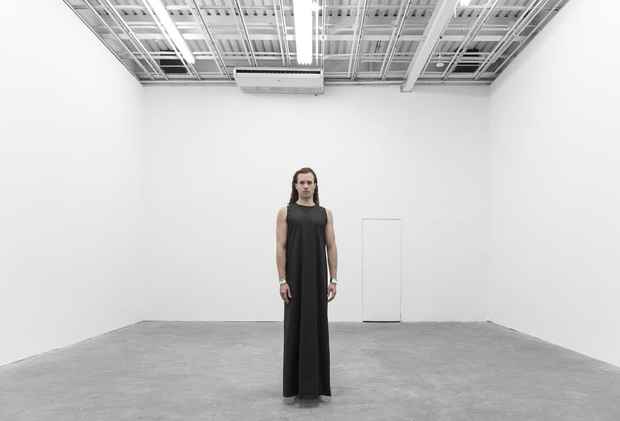R. B. Schlather “Opera: Orlando”
WHITE BOX

This event has ended.
Whitebox Art Center presents the work of opera director R. B. Schlather in his second feature with WhiteboxLab>Sound Lounge. For two weeks, Whitebox’s main exhibition space will act as a laboratory hosting the second opera in the George Frideric Handel trilogy, culminating in two theatric presentations of Handel’s Orlando, an 18th century baroque opera. This theatric installation draws from the opera seria or “serious opera” of Orlando (1733), based off of Ludovico Ariosto’s epic poem Orlando Furioso.
WhiteboxLab>Sound Lounge and R. B. Schlather continue to respond to the changing landscape of operatic performance in New York City and around the world by staging this work in an untraditional opera venue. As a laboratory, WhiteboxLab>Sound Lounge is delighted to open all musical and staging rehearsals, from April 8th to the 23rd, prior to the General Rehearsal on April 24th at 7pm and the final presentations on April 26th and 27th at 7pm. A talk moderated by Joseph Cermatori will be held after the performance on the 27th. This program will be free and open to the public daily from 12pm to 7pm, excepting April 14th, 18th, and 25th. For the final performances, the opera will be enacted live with an orchestra, in Italian, utilizing new technologies with projected English subtitles.
Orlando follows R. B. Schlather’s innovative exhibition of Handel’s Alcina, performed in September 2014 at Whitebox Art Center. Handel based Alcina on Ludovico Ariosto’s best-seller Orlando Furioso, and composed two other operas derived from this epic poem: Orlando (1733) and Ariodante (1735). Esteemed classical music critic Zachary Woolfe of The New York Times praised Alcina for its open demonstration of operatic art form and process, describing it as “a valuable project that deserves enthusiastic support.” Orlando stays true to the structure of WhiteboxLab, remaining free and open to the public for rehearsals with an online video stream, capturing the unfolding rehearsal process. The opera series continues to spark questions of the dissolution of the opera institution in the contemporary cultural climate, through the development of a site-responsive baroque opera production.
In Orlando, Handel uses 18th century theatrical conventions of madness to write some of his most genre-defying dramatic vocal music, and one of his greatest scores. Orlando centers on the title character of Aristo’s Orlando Furioso, delving into Orlando’s battle with his unrequited love for the Queen of Cathay, Angelica, and his ensuing madness. Handel’s opera was based on the theatrical adaptation L’Orlando, alternately titled “The Madness of Jealousy,” written by Carlo Sigismondo Capeci and produced in Rome in 1711. In Handel’s version of Orlando, breaks from form create psychological and tonal ambiguities that depart significantly from traditional opera seria. These subleties of tone and formal disruptions unite with 18th century theatrical convention of madness, making way for a powerful and highly experimental score.
Orlando, a knight famous for chivalry, vacillates between obsessive love for the princess Angelica and heroic glory urged by his magical protector, Zoroastro. Angelica has fallen in love with the mysterious prince, Medoro, whose battle wounds she healed while he was in the care of the shepherdess Dorinda. Dorinda has also fallen in love with Medoro, who is torn between union with a noblewoman and the affections of a peasant while increasingly becoming the source of Orlandoʼs jealousy and violence. The opera develops as Orlando struggles with his love for Angelica that remains unfulfilled and leads him to increasingly hysterical behaviors, as the others navigate their own romantic knots.
R. B. SCHLATHER is an American opera director based in New York City. Recent directing credits include Norma at Gran Theatre del Liceu, Barcelona, Alcina at Whitebox Art Center WhiteboxLab>Sound Lounge, Lizzie Borden at Tanglewood Music Festival, Werther at Opera Company of Brooklyn, Treemonisha for New York City Opera Education, Some Call Refuge at Vaudeville Park, The Arianna Project for lauded early music group Musica Nuova, a concert with Nico Muhly and Gotham Chamber Opera at multimedia art cabaret (le) Poisson Rouge, and I. Were., a pastiche created with countertenor Anthony Roth Costanzo and dramaturg Joe Cermatori for the Salon/Sanctuary Concerts. He makes his American company debut directing a site-specific production of Philip Glassʼ In The Penal Colony for Boston Lyric Opera in 2015. Schlather holds a Bachelor of Arts degree in Art History, with a minor in Drama, from Ithaca College, where he graduated with special honors in Theater Arts.
R. B. Schlather’s production is part of Whitebox’s emreging program, WhiteboxLab>Sound Lounge, which aims to create sustained and in-depth exposure for artists working in temporal mediums such as performance, sound art, and literary arts, while providing a platform for audiences to experience artists’ practices.
Media
Schedule
from April 08, 2015 to April 23, 2015
Hours: 12 - 7pm.